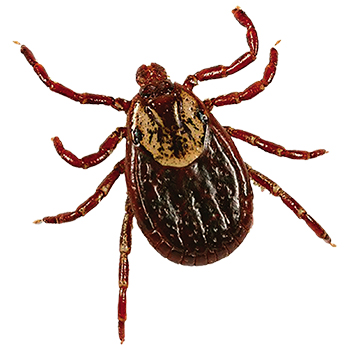Pennsylvania Tick Control Services

If you’re an avid hiker, camper, or love to spend time outdoors, you’ve probably been warned about ticks. These parasitic insects feed on the blood of animals and humans and leave red, swollen sores behind. Usually, these fade in a few days without issue, but sometimes these pests can transmit diseases like babesiosis, Lyme disease, and Rocky Mountain Spotted Fever. Tick pest control around your Pennsylvania home is essential to ensure you’re not exposed to these dangerous diseases. To protect your Pennsylvania home or business from ticks, you need to learn about the behavior of this pest, take steps for prevention, and find effective treatment options should an infestation occur.
What Are Ticks?
Ticks use their small, sharp mouthpieces to penetrate human skin, which is typically when we first notice them. Since ticks are so small, we have to be looking very carefully to spot ticks. Sometimes, these insects bite and then detach themselves after they’ve gotten a full meal. Tick bites usually appear as small red bumps, but they may develop into a rash with a characteristic bullseye pattern. This may be an indication the tick that bit you was infected with Lyme disease.
How to Identify Ticks
Pest control experts explain ticks are small, parasitic insects that feed on the blood of warm-blooded mammals. Within Pennsylvania, there are more than 25 known species of ticks, but four of the most common make up 90% of statewide sightings. The Pennsylvania pest control experts at Viking Pest explain these species are the American dog tick, lone star tick, black-legged tick, and groundhog tick. All four of these common tick species are a similar size and shape, with flat reddish-brown bodies and eight legs. Fully grown adult ticks only reach about 0.25 inches in length and younger nymphs and larvae are even smaller.
When Are Ticks Active in Pennsylvania?
The Pennsylvania pest control experts at Viking Pest explain like many other insects, ticks are most active in the warmer summer months. May through October is the peak time for the discovery of Lyme disease, which is often transmitted by younger nymph ticks. This is also because people spend more time outdoors in the summer, sitting in the grass and brushing by tall vegetation, which are behaviors that put us in close proximity to ticks. Most of the tick population in Pennsylvania is fully grown by October, and the pests may be more active in their pursuit of meals until November when the weather becomes too cold for them to survive. Ticks become dormant once temperatures drop below 40-degrees Fahrenheit. The best time to call the tick pest control professionals at Viking Pest is during the active months if you have an infestation or otherwise need recommendations and help to control and to treat the problem.
What Problems Do Ticks Cause in and Around My Pennsylvania Home or Business?
Encouraging prevention from ticks is extremely important and a recommendation of Viking Pest, the pest control experts in Pennsylvania. Ticks can be a major outdoor nuisance, and keeping your business or home free of these pests is the only way to ensure your family, pets, friends, and customers are protected from the diseases they can carry. More than 8,000 infected ticks have been found in Pennsylvania carrying life-altering diseases like Lyme disease, Powassan virus, anaplasmosis, and babesiosis. Even if they don’t transmit diseases, tick bites can easily become infected, which may require antibiotics to clear up.
How to Control Ticks in Pennsylvania
The Pennsylvania pest control experts at Viking Pest explain the easiest way to control ticks is to exercise caution when spending time outdoors, even on your lawn or business yard. Ticks can’t fly or jump, so they need you to be extremely close before they crawl onto you. Avoid sitting on the ground without a blanket or tarp and exercise caution when passing through areas of tall grass. Protect your exposed skin by wearing long-sleeved garments and opt for closed-toed shoes and socks when spending time in nature. There are also steps you can take to responsibly landscape your yard or property, which makes your space as unwelcoming to ticks as possible. The Pennsylvania pest control experts at Viking Pest recommend getting rid of large areas of tall grass and disposing of dead leaves and fallen branches where ticks could be hiding.
When it’s time to learn how to get rid of ticks in or around your Pennsylvania home or business, consult the tick pest control expert from Pennsylvania at Viking Pest, who can help you take back control of your yard by suppressing local tick populations. Viking Pest uses Yard Guard: Mosquito and Tick Control to reduce tick populations in your yard.
Protecting Your Pennsylvania Home or Business From Ticks With Viking Pest Control
Viking Pest offers expert treatment designed to effectively and efficiently control and prevent ticks from invading your home or business in Pennsylvania. Our use of Integrated Pest Management (IPM) techniques focuses on finding the core of the pest concern and controlling ticks from the source. Through IPM, pest control materials are selected and applied in a manner that minimizes risks to human health, pets, and the environment. Call Viking today for your FREE and NO OBLIGATION estimate at 1-800-618-2847 or schedule online today!















